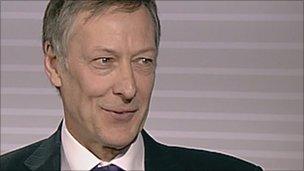Demonstration over Surrey County Council's budget plans
- Published

Council leader Dr Andrew Povey promised more money for Surrey's highways
Union activists have held a demonstration against planned cuts to Surrey County Council's budget which they claim will "slash services".
Protesters from the Unison and Unite unions protested outside a meeting of the full council as councillors set next year's budget and council tax.
Up to 650 jobs could be lost as the Conservative-run authority looks to save more than £200m over four years.
Members agreed to spend £34m on roads over four years and freeze council tax.
The authority has said it intends to limit the number of redundancies by leaving vacancies unfilled and redeploying staff where possible.
'Storing up problems'
During the protest, Unison spokesman Chris Leary said: "Proposals being put to the council are a cutter's charter. If Surrey County Council really do stand up for local people, then they should fight for every penny."
Regional organiser Sarah O'Donoghue said spending cuts would hit virtually all areas of the council, including children's and adult services and libraries.
She said: "These cuts will cause great hardship among Surrey residents, impact on the local economy and store up costs and problems for the future."
Spending plans agreed by the council on Tuesday included the first council tax freeze in the authority's history.
The council pledged to spend an extra £12m on roads over the next four years, with £4m to be spent on improvements in the next financial year.
Capital funding of £22m was allocated to major highways projects over the next four years.
Council leader Dr Andrew Povey said: "There will be no council tax rise from the county council. That is the best thing we can do for the people of Surrey.
"There will be more money for our highways. It will allow us to start to catch up with the backlog of repairs."
Liberal Democrat councillor Hazel Watson welcomed the council tax freeze but said the authority was proposing to cut services that "really mattered" to residents.
She said the council should spend its reserves instead of setting £8m aside as a contingency, cut spending on administration and communications, use its surplus buildings to raise income, and do a better of job of collecting money because it was currently owed £12m in unsecured debt.
- Published5 February 2011
- Published31 January 2011
- Published21 December 2010
- Published25 November 2010